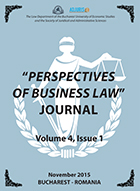THE LEGISLATIVE TECHNIQUE AND PRESUMPTION OF THE OBLIGATION TO KNOW THE LAW
THE LEGISLATIVE TECHNIQUE AND PRESUMPTION OF THE OBLIGATION TO KNOW THE LAW
Author(s): Emilian CiongaruSubject(s): Law, Constitution, Jurisprudence
Published by: Societatea de Stiinte Juridice si Administrative
Keywords: legal rule; legal proceedings; legal presumption; legal fiction; knowledge of the law
Summary/Abstract: Entitled as such to bring forward the law, the legislative institutions shall find the most appropriate expression in the legal language, in the content of legal norms and the manner this language is perceived by those to whom it addresses. In this respect, it makes use of certain specific procedures for bringing forward legal rules, procedures whose purpose is to explain and express as clearly as possible the legal rules it decides upon. The important proceedings used by the legislator are presumptions and fictions where the presumption considers that something is true, without any evidence and without proving its existence and the fiction is a certain process of the legislator or the judge by means of which a fact is deemed to exist or to be established although it does not actually exist neither has it really been established. An important presumption one can operate with is the presumption to know the law upon its publication, an presumption otherwise considered to be conclusive, unlikely to be challenged by anyone and under no circumstances. This presumption can have hard and undesirable effects in so that the individual called to account for the violation of law can bring evidence to testify he was actually in the effective impossibility of knowing the law.
Journal: Perspectives of Business Law Journal
- Issue Year: 2015
- Issue No: 04
- Page Range: 16-22
- Page Count: 7
- Language: English

